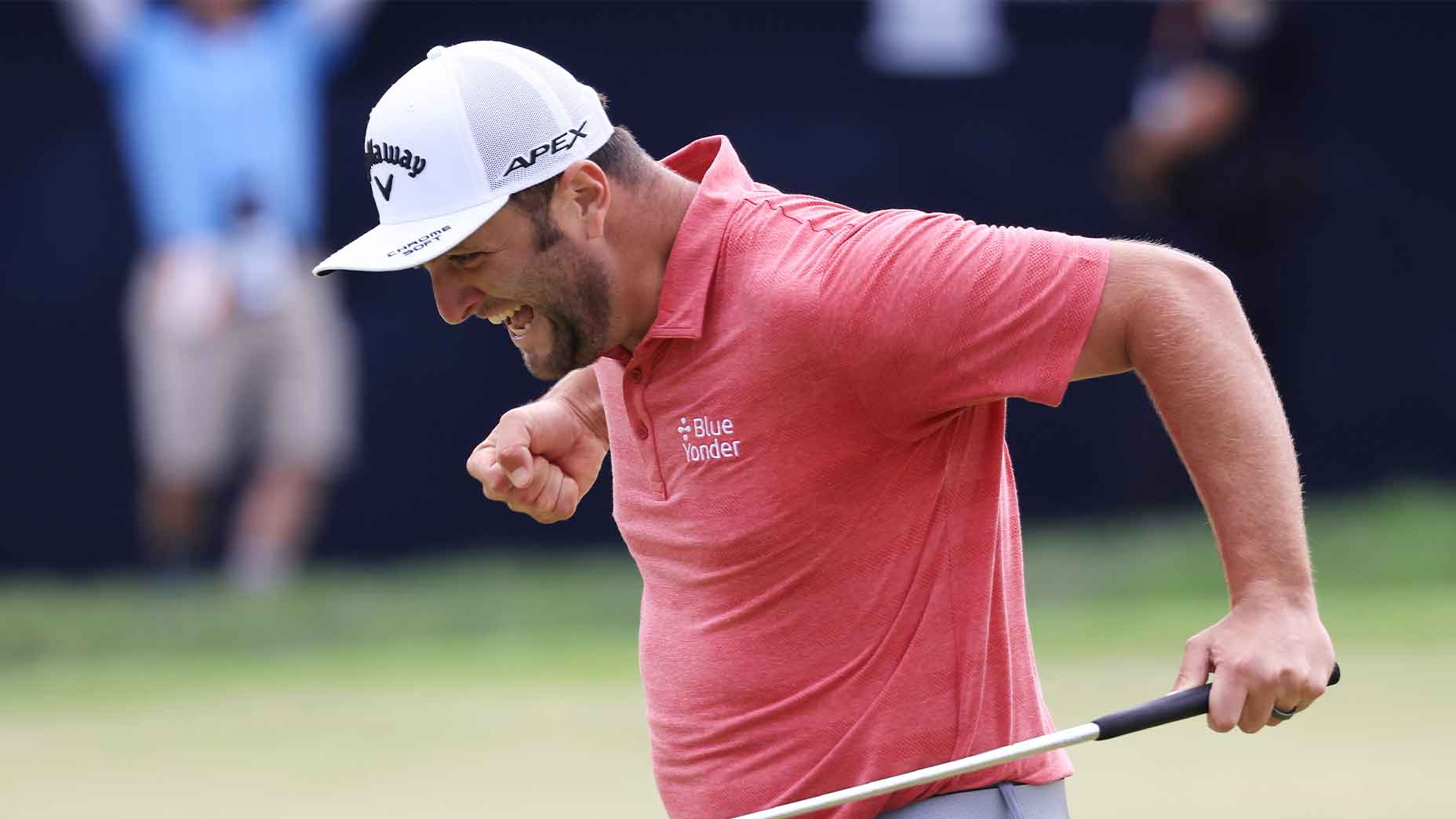Fifteen days before Jon Rahm stopped off the 18th green at Torrey Pines clutching his infant son Kepa and basking in the glow of a historic U.S. Open victory, he stood in the exact same spot at Muirfield Village in a decidedly different place.
On that day, June 6, PGA Tour officials greeted Rahm with devastating news. Just minutes earlier, his Covid-19 test from that morning had come back positive. Under Tour protocols, he’d be forced to withdraw from the event, leaving a six-stroke 54-hole lead by the wayside.
As he learned the news, Rahm slumped to his knees. His head dropped into his hands. In the span of his short professional career, the 26-year-old’s mannerisms have drawn their fair share of attention, but no one had ever seen Rahm quite like this.
Later that night, Rahm released a statement on social media addressing the situation.
“This is one of those things that happens in life,” he said. “One of those moments where how we respond to a setback defines us as people.”
Perhaps Rahm’s performance at Torrey Pines could have been expected. Through three rounds, his play at the Memorial Tournament was nothing short of dazzling. Rahm hit every spot, executed every shot, and drained every putt. After a soggy second round bled into Saturday morning, he nearly made two aces on the same hole in the same day — expressing mild surprise when his second tee shot on the par-3 16th at Muirfield Village landed a mere eight feet from the flagstick late in the afternoon. Seconds later, he poured in the birdie anyway.
But then again, there was no way of predicting the oft-irascible Spaniard would respond like this. That he wouldn’t dwell on a devastating loss, on $1.72 million squandered, on the worst outcome of his professional career.
There’s been a lot made of young Kepa Rahm’s impact on his father. Of course, Rahm has been the victim of immaturity at times throughout his career; and what better way to avail a young man of such problems than to provide for another human being? Media types have enjoyed so much prognostication around the elder Rahm’s supposed newfound “perspective,” it’s become something of an inside joke.
Yes, it was hyperbole. But then Rahm won the U.S. Open.
How he won the Open — with jaw-dropping birdie putts on each of the final two holes — was ostensibly less important than how he handled the Open. He never flinched, didn’t waver, and struck precisely when the moment dictated (his first solo lead came on the 72nd green). Mistake-free golf wouldn’t be enough to win on Sunday, which Rahm was smart enough to realize, and cool enough to keep his head during a seven-hole birdie-less streak while he trailed on the back nine.
That he achieved such a historic feat in such dire circumstances is impressive. That he did so just weeks removed from soul-crushing disappointment is nothing short of miraculous.
“This is the power of positive thinking,” he said in an interview with NBC after the round. “I was never resentful for any second for what happened, and I don’t blame anybody.”
His tone in the wake of his victory was defiant, but not callous. He is intimately familiar with the ruthless nature of the disease he was stricken.
“This is — it’s been a difficult year, and unfortunately, Covid is a reality in this world and it’s affected a lot of people,” he said. “We have lost a lot of people back home. We have lost some friends.”
Of course, no one would have blamed Rahm for absorbing his moment in the limelight. He had every reason to celebrate the fruits of his redemption tour.
But of course, he didn’t do that.
“I know what happened a couple weeks ago, some people might say was not fair, but it has to be done,” he said. “We still have to be aware of what’s going on in this world and take care of yourself and everybody around you so we can get over this as quick as possible.”
Naturally, the conversation shifted to that beloved little buzzword, perspective.
On Father’s Day — his first Father’s Day — he celebrated the finest achievement of his life with his father and son in attendance.
“We’re going to have fun,” he said. “There’s three generations of Rahms on this green right now. One of them doesn’t know what’s going on, but he’s going to get to see it in the future and enjoy it.”
Make no mistake about it, Jon Rahm found new perspective at the U.S. Open. Fifteen days ago, he told us he would.
“It’s the exact reason why I won,” he said. “It had to happen in a beautiful setting like this. Nothing in my life has come easy, and definitely managing the emotions of knowing what could have been done today wasn’t the easiest either, but I used it to my advantage in the last few holes.”
